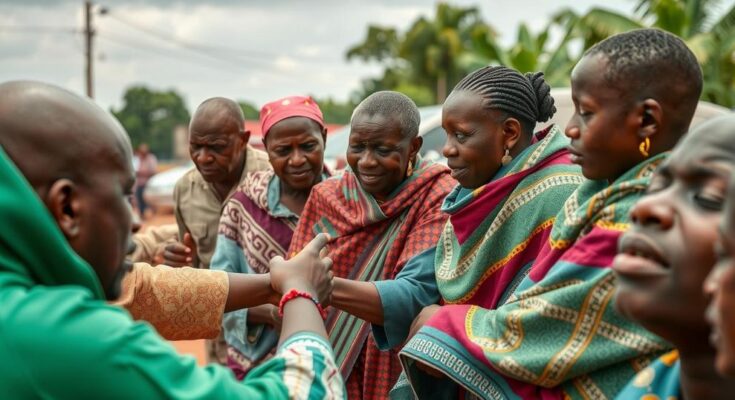Ituri province in the DRC has endured over a decade of inter-ethnic conflict, particularly between the Lendu and Hema communities. Amidst this violence, local reconciliation initiatives are gaining momentum, revealing a profound resilience among the populace. Former combatants and community leaders are actively engaging in peace-building projects, aided by government and international efforts aimed at restoring stability and fostering sustainable peace. However, significant challenges, including corruption and ongoing violence, must be addressed to facilitate long-lasting reconciliation.
For over a decade, Ituri province in the Democratic Republic of Congo (DRC) has been marred by intense inter-ethnic conflicts primarily between the Lendu and Hema communities. The roots of these clashes are deeply embedded in historical disputes over land and resources, which have been exacerbated by external influences and the exploitation of local tensions by national and international actors due to the region’s rich mineral deposits, particularly gold. The ongoing violence has resulted in a humanitarian crisis, yet there are signs of resilience as local initiatives emerge to foster peace and reconciliation among communities.
The conflict in Ituri can be traced back to centuries of rivalry between the Hema, who are traditionally herders, and the Lendu, primarily agriculturalists. These tensions escalated after the political and economic upheavals that the DRC experienced during late 20th-century wars. Furthermore, the decline of state authority in the region has led to young individuals being coerced into armed resistance, compounding the struggles of regular communities.
Amidst this turmoil, inspiring stories of transformation are emerging. Individuals such as Elle Alphonsine Cecile, a former combatant, have begun to champion reconciliation efforts, expressing regret over their involvement in violence. Cecile, who took up arms at the tender age of fifteen, articulates her disillusionment: “It was the absence of peace that drove us to take up arms… Today, I regret my actions. Living conditions remain precarious, but I believe that a future of stability is possible.” Her sentiments reflect a broader commitment among local individuals to foster dialogue and cooperation among previously warring factions.
Community dialogues facilitated by local organizations have allowed former rivals to converge and share their experiences, fostering mutual understanding. Young community leaders such as Cecile and Ngabu Jospin are actively engaged in initiatives aimed at rebuilding trust through projects like rural road maintenance. Jospin states, “Peaceful coexistence is better than unnecessary conflicts that plague the region.” This collective effort showcases the potential for grassroots movements to unite diverse communities toward a common goal of fostering peace.
The Congolese government, with support from international organizations, has initiated a multifaceted strategy to restore order, which includes military action against armed groups, disarmament programs, and socio-economic development initiatives. Although significant strides have been made, including military offensives that liberated vital areas, ongoing violence and humanitarian issues remain pressing concerns as targeted lands and resources continue to provoke ethnic tensions.
Moreover, local governance issues exacerbate the situation as corruption and inefficiency undermine peace-building efforts. National deputy Gracien Iracan de Saint-Nicolas emphasizes the need for stronger local governance to bolster community confidence in state institutions. Meanwhile, various local associations work tirelessly to promote dialogue, rebuild trust, and address misconceptions that fuel ethnic discord.
Women’s groups are particularly vital in peace initiatives, as they respond to direct experiences of violence with leadership in reconciliation efforts. Their active involvement is crucial for any sustainable resolution to the ongoing conflicts. The Iturian diaspora also plays a role by supporting development projects aimed at fostering stability and peace in their homeland.
In envisioning a peaceful future for Ituri, it is critical that national and international support coalesce around local initiatives. This necessitates robust transitional justice frameworks and the rejuvenation of state authority to ensure security and equitable management of resources. Despite the challenges, the resilience and determination of communities, exemplified by individuals like Cecile and Jospin, suggest that Ituri may transform from a region plagued by violence to one of reconciliation and coexistence.
Ituri province, located in the eastern part of the Democratic Republic of Congo, is historically embroiled in inter-ethnic strife, particularly between the Lendu and Hema communities. The roots of this conflict lie in deep-seated disputes over land and access to natural resources. The region’s political and economic instability, aggravated by external interventions and the allure of its mineral wealth, has led to exploitation and further violence. Consequently, these conflicts have not only humanitarian implications but have also stifled development and imposed severe suffering upon local populations, necessitating comprehensive peace-building efforts.
In conclusion, despite the persistent challenges faced by Ituri province, the burgeoning efforts of community leaders and organizations toward reconciliation present a beacon of hope. By fostering dialogue, rebuilding trust, and supporting local initiatives aimed at peace, there exists a tangible opportunity for Ituri to redefine its narrative from one of conflict to one of resilience and harmony. The commitment demonstrated by individuals such as Cecile and Jospin highlights the potential for transformative change through collaborative action and sustained support from both national and international partners.
Original Source: peacenews.com




